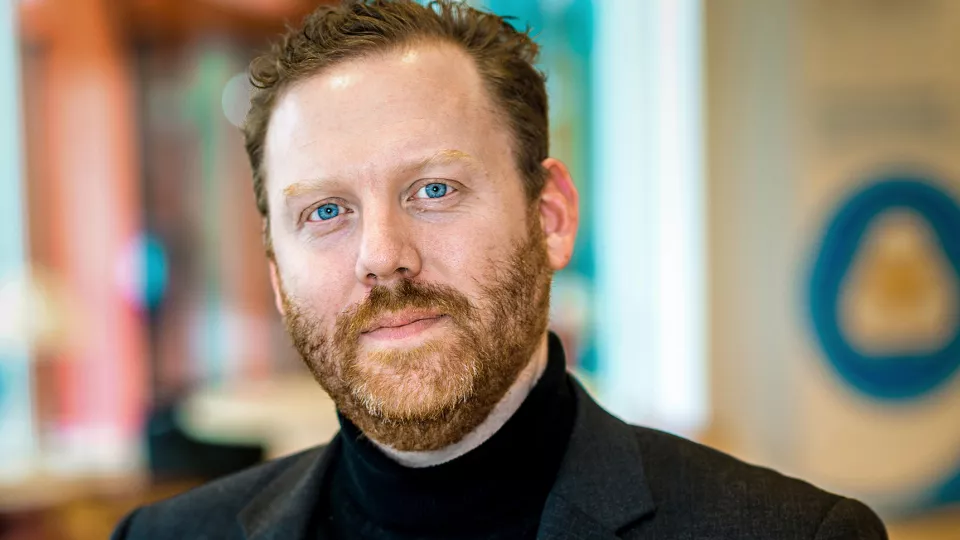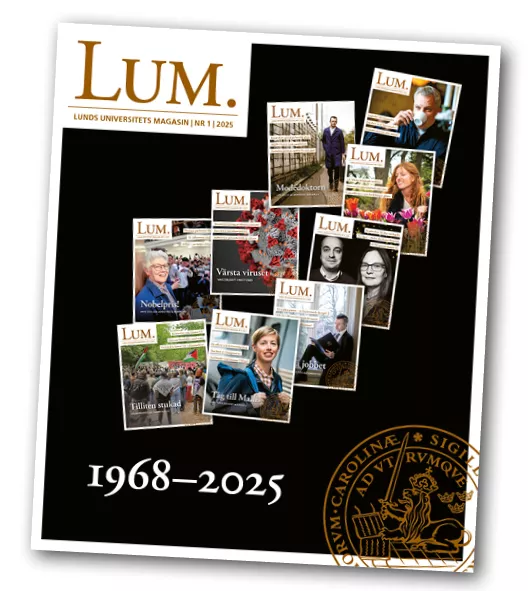Jimmie Kristensson is taking the opportunity to breathe a little fresh air outside the Wrangel building. He has been in non-stop video meetings all day. Since January, he divides his time between being a research team manager and pro vice-chancellor for communication, integrity and character. The vice-chancellor's management team has had a different kind of start.
"I don't know whether I would recognise all the people in the management group if I saw them from behind in the street; we have never met all together in real life", says Kristensson.
Previously, work environment issues were rarely addressed strategically by the management, but were handled by the administration instead.
"My assignment is probably rather unique and shows that we take these issues seriously", he says.
Believes in finding environments with a good atmosphere
Jimmie Kristensson is an associate professor in health sciences and has been at LU since 2003, with a brief six-month excursion to Blekinge Institute of Technology. His choice to leave Lund was partly due to the work environment – so he knows how it can affect job satisfaction, which he considers to be hard currency for the University.
"There is so much freedom and so many opportunities here – it is a fantastic place. But if my main task is to be smart, there must be the conditions for it."
He doesn't believe in sticking your elbows out, but rather in finding environments that are characterised by freedom of expression and a good atmosphere.
"For me, enjoying myself at work is crucial – and that is possible even if research has ambitious goals. Of course everyone has a responsibility to contribute to creating that positive culture."
First step towards new organisation has been taken
Kristensson previously worked with ethics and employeeship at the Faculty of Medicine. He says they got a certain momentum going on the issues including new leadership courses.
Jimmie Kristensson recently completed the university-wide project for gender equality and equal opportunities aiming to propose more efficient working methods. This started in spring 2020 with a large number of interviews with virtually everyone working on these issues. There was also a review of previous work in the area. The report that was produced showed that gender equality and equal opportunities work needs to be reorganised to gain traction.
The first step for the new organisation has now been taken and the new council for gender equality and equal opportunities with management representatives from all the faculties has held its first meeting. The council is supported by an expert group to ensure that decisions are based on research. Meanwhile, a support team has been launched within the central administration to support the faculties in their preventive work against harassment and discrimination. Jimmie Kristensson thinks this can become a powerful organisation.
"We are really on the right track and the planning work together with the faculties is now about to start."
Hope to develop common work methods
The most recent work environment survey at the University, which included both the organisational and social work environments, showed as usual that stress is the cause of many people feeling unwell and going on sick leave. A high workload, unclear boundaries between work and leisure time and the psychosocial aspects – strained relationships with colleagues and managers – are among the causes.
"There is more to be done in the systematic management of the organisational and social work environment. I hope that we can develop common working methods and believe that we need to formalise the discussions about how we are getting along."
But Kristensson thinks that stress is a difficult concept to discuss in general terms as different people get stressed by such different things. For his part, he plans his work meticulously to achieve a sense of control and always keeps his Saturdays free.
"What can stress me is the balance between work and private life – I want to be completely present at family dinners and make it in time to football practice and that isn't always easy."
And if you could wave a magic wand and change something in the work environment in one go, what would it be?
"I would strengthen leadership, so that managers get better and quicker at picking up on things that are not going well. I really believe in daring to address conflicts at an early stage before they have got out of hand."
He thinks that part of leadership is about self-knowledge, but that employees also need to be clear to their managers.
"Increased power often leads to less feedback…"
As he is leading a research team in proactive, integrated healthcare, he is well aware that it is more difficult to practice leadership remotely, in particular to pick up early signals of something going wrong.
"More feedback and encouragement are definitely needed when you don't meet in person."
Significant voices risk being silenced. Eventually, the fact that knowledge doesn't reach the public can become a threat to democracy.
Hate messages and threats against researchers are another work environment problem that also threatens academic freedom. Jimmie Kristensson thinks that it is urgent to provide researchers with support in communicating and standing up for their research, even when it stirs people up and leads to strong reactions – usually on social media.
"Significant voices risk being silenced. Eventually, the fact that knowledge doesn't reach the public can become a threat to democracy."
Otherwise, the risk is that researchers censor themselves and even choose not to research certain fields.
“When that is the trend, researchers should feel that the University has their back and that collegial support kicks in”, he says, emphasising that this is something he will work towards.



